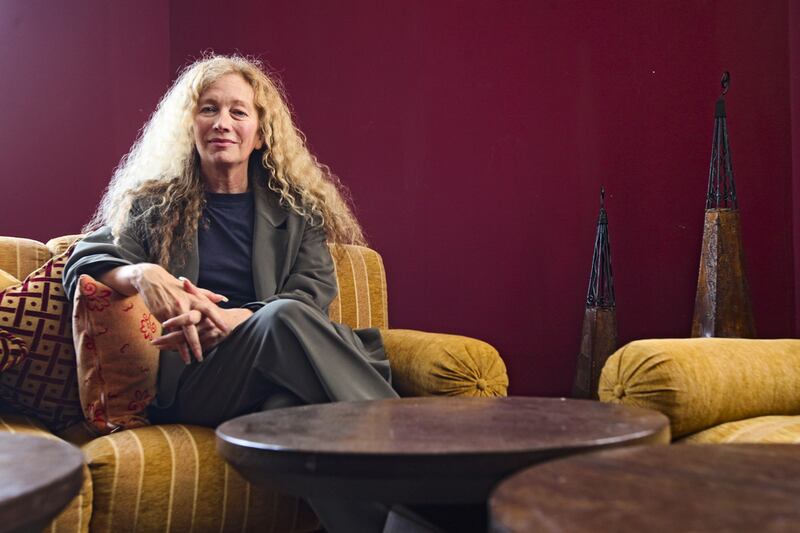At least 23 feature films have been made in the UAE, but few of them have been directed by women.
Even on the growing list of Hollywood and Bollywood films shot in the Emirates, female directors are conspicuously absent.
This has not gone unnoticed by industry insiders Michelle Nickelson, an American who has worked in film financing in the UAE for 12 years, and Dedra Stevenson, the Emirati-American executive producer of the award-winning short film Lemonade, directed by Emirati Sarah Al Hishemi.
In 2011, Nickelson co-founded the UAE branch of Women in Film and Television, a global network with 37 chapters and over 10,000 members.
It is dedicated to advancing the professional development of women working in screen-based media.
The Facebook page for the UAE group has more than 2,200 followers, but, until now, its activities have been limited by the lack of business licence.
“A non-profit social-group licence just wasn’t available,” says Nickelson. “We started by being volunteers, and events had to be sponsored, through NYU Abu Dhabi and businesses interested in what we were doing.”
Now, non-profit licences are available in Abu Dhabi, which will allow the group to charge membership fees and organise educational workshops.
“We really need this in the UAE, where there’s lots of interest, but not so much experience,” says Nickelson.
“I deal mostly in the financial end of media, and there are probably not three people here who know anything about this subject.
“Working with someone like Film Independent [an American non-profit organisation behind the Independent Spirit Awards] for educational workshops would be amazing.”
For Stevenson – who is working on the script for a movie version of her horror novel The Skinwalker: The Resurrection, which she launched at the Middle East Film and Comic Con this month – the biggest potential advantage offered by the group is the benefits of networking to assemble resources.
“Individually, it’s very hard to pull off a film by yourself,” says Stevenson. “I see a lot more women these days out there trying to make films but not succeeding. Locating the money and resources is a challenge.
“But if we’re united, we can be strong and have a big voice about what gets shown at cinemas around here.”
The issue of how to promote the role of women behind the camera has been in the spotlight lately. Some of the region’s top female filmmakers gathered in Dubai last month at film and TV industry trade show Cabsat to discuss the challenges and opportunities they face. A few weeks earlier, the World of Women Film Fair Middle East was held in Dubai, showcasing films made by women.
Nickelson cites Emiratis Amal Al Agroobi, Nujoom Al Ghanem and Nayla Al Khaja as names to watch out for.
“Amal is a groundbreaker,” says Nickelson. “Nujoom could be considered a UAE national treasure. Her films have a lovely feature style to them. And Nayla is an active commercial director.”
Hermoine Macura, an Australian living in Dubai who organises the World of Women Middle East through her company Straight Street Media, sees plenty of local female filmmaking talent.
“However, they don’t have the opportunities available to showcase their work and get it to that next level where it can be taken seriously,” she says.
“I don’t believe women need to have special quotas to get opportunities, I believe the best person for the role should win based on merit – so why not work together to create organisations, competitions and platforms so the best among our societies can put their gifts and skills to work?”
A personal view of autism

Dedra Stevenson. Courtesy Dedra Stevenson
Female filmmakers often touch on themes neglected by male moviemakers in the UAE. For example, Lemonade, which sheds light on the issue of autism in the UAE and won the Best Director Award at the recent World of Women Film Fair Middle East.
“Sometimes life doesn’t give you a straight path, so you have to create your own,” says Dedra Stevenson. That is what she did for her 24-year-old autistic son, Ibrahim. With few services available for autistic adults, when he was deemed too old to attend his special-needs school, Stevenson hired two male nurses and set up a makeshift school at their home in Sharjah.
Stevenson made her family's story the subject of Lemonade, a 23-minute documentary, which she produced. It was directed by Emirati Sarah Al Hashemi, her former student when Stevenson was a media studies teacher at Zayed University in Dubai.
“I wanted to show this film to the country and to the world because it might give some other families hope for what to do when you’re faced with the same situation,” says Stevenson. “Autistic kids grow up into autistic adults, and if the society doesn’t pay attention, they’re going to end up with an awful lot of adults who are not leading meaningful lives.”
• Lemonade will be shown as part of autism awareness month, on April 19, 7.30pm, at Vox Cinemas, Mall of the Emirates. Email dedra@bluejinnimedia.com for details
artslife@thenational.ae





